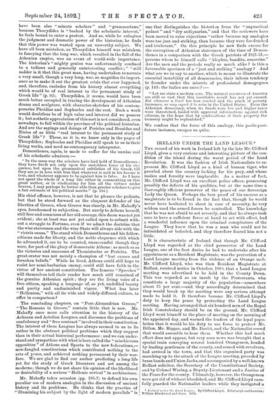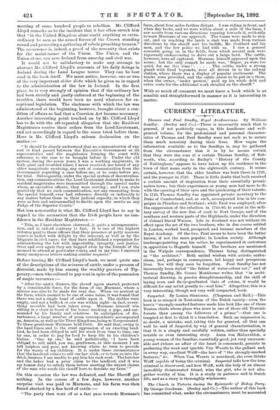IRELAND UNDER THE LAND LEAGUE.* THE record of his work
in Ireland left by the late Mr. Clifford Lloyd, gives a very curious and interesting picture of the con- dition of the island during the worst period of the Land Revolution. It was the fashion of Irish Nationalists to re- present Mr. Clifford Lloyd as a kind of human tiger, who prowled about the country looking for his prey, and whose malice and ferocity were implacable. As a matter of fact, Mr. Clifford Lloyd was an excellent police officer, possessing possibly the defects of his qualities, but at the same time a thoroughly efficient preserver of the peace of our Sovereign Lady the Queen. Perhaps the best proof of his success as a magistrate is to be found in the fact that, though he would never have hesitated to shoot in case of necessity, he very seldom used the armed forces he controlled. The knowledge that he was not afraid to act severely, and that he always took care to have a sufficient force at hand to act with effect, had a wonderful influence upon the criminal conspirators of the League. They knew that he was a man who could not be intimidated or befooled, and they therefore feared him not a little.
It is characteristic of Ireland that though Mr. Clifford Lloyd was regarded as the chief persecutor of the Land League, one of the first duties he had to undertake after his appointment as a Resident Magistrate, was the protection of a Land League meeting from the violence of an Orange mob. Mr. Clifford Lloyd, who was then Resident Magistrate at Belfast, received notice in October, 1880, that a Land League meeting was advertised to be held in the County Down. This was regarded as an insult by the Protestants, who constitute a large majority of the population—somewhere about 75 per cent.—and they accordingly determined that they would break up the meeting were any serious attempt made to hold it. It therefore became Mr. Clifford Lloyd's duty to keep the peace by protecting the Land League meeting. Having arranged that six hundred men of the Royal Irish Constabulary should be on the ground, Mr. Clifford Lloyd went himself to the place of meeting on the morning of the appointed day, and warned the leaders of the loyal popu- lation that it would be his duty to use force to protect Mr. Dillon, Mr. Biggar, and Mr. Davitt, and the Nationalist crowd that would assemble to hear them. Whether this had much effect does not appear, but very soon news was brought that a special train conveying several hundred Orangemen, headed by leading gentlemen of the county, and armed with revolvers, had arrived in the town, and that this organised party was marching up to the attack of the League meeting, preceded by brass bands and Union Jacks, and accompanied by a well-known Belfast solicitor, the Secretary of the Constitutional Society, and by Colonel Waring, a Deputy-Lieutenant and a Justice of the Peace for the county. Ultimately, however, the Orangemen were got rid of without bloodshed, and Mr. Clifford Lloyd care- fully guarded the Nationalist leaders while they instigated a * Ireland under the Land League. By Clifford Lloyd. Edinburgh and London : William Blackwood and Sons. 1c92.
meeting of some hundred people to rebellion. Mr. Clifford Lloyd remarks as to the incident that it has often struck him that "in the United Kingdom alone could anything so extra- ordinary be seen as the armed forces of the Crown standing round and protecting a gathering of rebels preaching treason." The occurrence is, indeed, a proof of the necessity that exists for the maintenance of the Union. The Union, and the Union alone, can save Ireland from anarchy and civil war.
It would not be satisfactory to make any attempt to abstract Mr. Clifford Lloyd's accounts of his daily doings in Ireland during the Land League terror. They can be best read in the book itself. We must notice, however, one or two of the very important obiter dicta which be gives us in regard to the administration of the law in Ireland. In the first place, be is very strongly of opinion that if the ordinary law had been strictly and justly enforced at the beginning of the troubles, there would have been no need whatever for ex- ceptional legislation. The slackness with which the law was administered at the beginning, however, brought about a con-
dition of affairs so bad that a Coercion Act became necessary. Another interesting point touched on by Mr. Clifford Lloyd has to do with the oft-repeated allegation that the Resident Magistrates receive their orders from the Lord-Lieutenant, and act accordingly in regard to the cases tried before them. Here is Mr. Clifford Lloyd's solemn declaration on the matter :-
" It should be clearly understood that no communication of any sort or kind passed between the Executive Government or its representative and the magistrates forming the court with reference to the case to be brought before it. Under the old system, during the seven years I was a working magistrate, in both quiet and troubled times, I never received, nor heard of any other magistrate receiving, any sort of communication from the Government regarding a case before me, or to come before me, for trial. Subsequently, under the special system of decentralisa- tion, any communications the Lord Lieutenant desired to make to resident magistrates were transmitted through the special under whom, as executive officers, they were serving ; and I can state positively that no such communication, nor any emanating from the special himself, ever had reference directly or indirectly to any matter before them in their judicial capacity, in which they were as free and untrammelled to decide upon the merits as any Judge of the Superior Courts."
Not less noteworthy is what Mr. Clifford Lloyd has to say in regard to the accusation that the Irish people have no con- fidence in the Resident Magistrates :-
"This, as I have elsewhere observed, is quite a misrepresents- tion, and is indeed contrary to fact. It is one of the highest tributes paid to these officers that their presence at petty sessions courts is hailed with delight by the innocent, as well as by the litigants in civil cases ; for they have established a reputation for administering the law with impartiality, integrity, and justice. Over and over again they are begged even by the friends of the accused to attend at particular courts, and in my time I received many anonymous letters making similar requests."
Before leaving Mr. Clifford Lloyd's book, we must quote one of the descriptions of the seizures of cattle, under a process of distraint, made by him among the wealthy graziers of Tip- perary,—men who refused to pay rent in spite of the possession of ample resources :-
" A fter the men's dinners, the sheriff again started, protected by a considerable force, for the farm of one Murnane, where a seizure was also to be made for rent due. When we arrived at the farm, which seemed to be one of some value, it was found that there was not a single head of cattle upon it. The stables were empty, and not a bullock or cow was within sight—in fact, every.- thing movable had been taken away. Murnane himself was sitting in a chair in front of his house smoking a pipe, and sur- rounded by his family and relatives. In anticipation of dis- turbances, a large number of press correspondents accompanied us, America, as well as the Three Kingdoms, being well represented. To these gentlemen Murnane held forth. He said that, owing to the hard times and to the cruel oppression of an exacting land- lord, he had been obliged to sell his stock from time to time, one by one, in order to pay for food to keep life in his children's bodies. ' One by one,' he said pathetically, I have been obliged to sell, until, you see, gentlemen, at this moment I am left helpless and poor, not knowing where to turn to provide for the wants of my children. It is under these circumstances that the landlord comes to sell our last stick, or to turn us into the ditch, because I am unable to pay him his rack-rent. The butcher and the baker had a prior claim to the landlord, and it was my honest duty to satisfy them before meeting the unjust claims of the man who sends the sheriff here to desolate my farm.."' On this occasion the law was defeated, and the Sheriff got nothing. In the course of a few days, however, another surprise visit was paid to Murnane, and his farm was then found stocked by a fine herd of cattle:—
"The party then went off at a fast pace towards Murnane's
farm, about four miles farther distant. I was riding in front, and when day broke, and we were within about a mile of the farm, I saw scouts from various directions running towards it, evidently to warn Murnane of our approach. The teams were made to step out, and on reaching the lands a rush was made from various directions by the sheriff and his bailiffs, Mr. Goddard and his men, and the few police we had with us. I saw a general scramble going on in the fields, from which several men were vigorously endeavouring to drive out a large herd. The cattle, however, were all captured. Murnane himself appeared upon the scene ; but the only remark he made was, Begor, ye were too quick for me this time ' The cattle, under a strong guard with fixed bayonets, were all driven in to the railway station, where there was a display of popular excitement. The trucks were provided, and the cattle about to be put into them, when the owner, ' under protest,' paid up his whole debt and extra costs for the additional work entailed on the sheriff."
With so much of comment we must leave a book which is as sensible and straightforward in manner as it is interesting in matter.



































 Previous page
Previous page